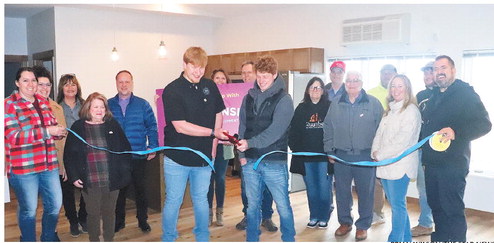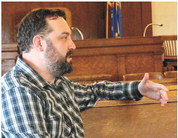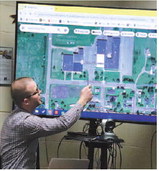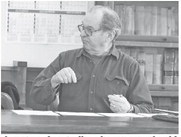WHO donates book vending machine to Granton school
It’s the middle of a school day at the Granton Area School District, and a child is itching for something to sate a specific kind of hunger. Off they go to a special nook in a corner of the elementary school building where a vending machine is located. They put in the necessary tokens, make their selection and lift the flap to pull out... a book.
A book? Yes, a book. For the vending machine that the Granton School District recently unveiled to their students is no ordinary vending machine. Instead of dispensing out snacks or drinks, this machine distributes books -- fiction, nonfiction, chapter and picture -- which the student then owns and is free to read at their leisure.
“The vending machine fits big books, chapter books and all sorts of other books,” said Kim Aumann, instructional and behavioral coach at the school district. “The machine can fit up to 200 books, and there are a variety of books in there. There are picture books, books that are popular with the kids like Junie B. Jones, fiction and nonfiction.”
The book vending machine will be a permanent fixture at the school thanks to a donation by the Marshfield-based Women Helping Out (WHO) organization. The group was founded back in 1998 by a group of schoolteachers in Marshfield with the purpose of financially assisting organizations that help women and children. These days, WHO is operated by Sally Wisinski and Sue Hasenfang of Marshfield, and together they put on the WHO's annual charity golf outing that raises money for a charity of their choice.
“It's two of us, not a big organization,' said Wisinski. “Sue and I have been doing this for the past eight years; prior to that there was a group of teachers that started this back in 1998. They got the idea from a different golf outing and decided to bring it back to Marshfield. The idea was to help organizations that help women and kids around the Marshfield area. They started this to raise money for them.”
The story of how the machine was brought to Granton is an interesting one. A few years ago, Aumann said she read a news article about the book vending machine. She thought the concept of distributing free books to students this way was interesting, but knew that it would be difficult to secure the more than $6,000 needed to purchase it.
“I had seen an article almost three years ago about it,' she said. “I looked at it, but I knew this was something that was not in the school budget. It was hard to justify asking the school board for money to purchase it.”
So the idea sat in the back of her mind for the next few years until a chance meeting between Aumann and Hasenfang earlier this year allowed the little nugget of an idea to become a reality. A short time before their meeting, Aumann said the school had started the Growing Granton Strong Committee to help facilitate interconnectedness between the school and surrounding community. They had started to hold events with the community and at one of the bingo nights they held, Aumann met Hasenfang.
“Last school year we started the Growing Granton Strong committee and Sue Hasenfang was at one of our bingo nights,” said Aumann. “She runs an organization with Sally Wisinski and they run a golf outing every year and they give the proceeds from that to a charity, school or organization. They then asked us and wanted to know if we wanted to have a donation made to us. I met with Sally in February and shared the idea of the book vending machine and they loved it. They’re avid book readers and loved the idea of bringing this to the school and giving us the chance to have it.”
“Well, Sue had met Kim Aumann and they got to talking,” said Wisinski on the same subject. “We were looking for a charity to donate to at the time. We have helped schools in the past, Pittsville and Marshfield. Kim explained about the book machine that she had seen but that she was not comfortable going to the school board for it because it wasn't a need to have and didn’t feel like she should ask the board for money for it. We thought, ‘This is a good idea’; my mom was a children's librarian so books were always important to me. Kim gave us the information on it and when we sent out invitations to the golf outing we wrote who the money was going toward.”
The golf outing was held in July. As in years past, Wisinski said participation in the outing is limited to women only, but that they had one of the highest turnouts they have ever had for the event. In addition to the turnout, she said they had many volunteers from the Granton school come out that day to help out.
“We had the most women we have ever had for it,” she said. “I think they realized the importance of reading, especially in schools like Granton that may not be as well off as other schools. It was really nice to have the Granton school involved. They asked if they had questions and they volunteered on the day of the golf outing. There were so many of those volunteers that said, ‘If you need help next year, call us. We will help.’ It was very gratifying to see they were thankful for the donations. They were super to work with and we wish they do super well with this.”
In total, WHO raised $8,726 from their golf outing, which they then donated to the Granton School District. A little over $6,000 was used to purchase the vending machine itself, while a large selection of books were purchased with the remaining funds. According to Aumann, the number of books Granton initially purchased should be enough to get them through the next year or so, and they are working on ways to continue funding the purchase of more books for future years.
“The machine was customized with Granton’s logos and colors, that really shows us that this machine is ours,” she said. “We hope to keep some extra funds around to keep purchasing books and maybe even take requests from teachers and students for books in the future.”
Aumann said the school has implemented a monthly reading challenge program that rewards a student with a token if they complete the challenge. Those tokens can then be taken by the students to the vending machine to select a book of their choice, which is theirs to keep.
“In December, we had a bingo-based challenge, they had to read books that would let them fill a bingo card, and if they got bingo, they would get a token,” she said. “This was the first month we did this, and when we unveiled the machine and told the kids that everyone who completed the reading challenge would be able to get a book, they were very excited. There were even a few students that went home that night and completed the challenge so they could get a book.”
The unveiling of the book vending machine was also a special day for Hasenfang and Wisinski. Both were invited down on Dec. 20 to the ceremony, allowing them to see the efforts of their hard work being shown to the students for the first time.
“It was really special for us because we could see firsthand the results of our work,” said Wisinski. “Some of the little kids were so amazed and really enchanted by this. Books are very special to me and knowing that the kids are able to keep these books and what they need to do to earn tokens to get the books, is really special. I think that reading is very important for kids; it does a number of things for them. I hope this inspires some of them that were reluctant to read to get a book.”
Aumann agreed. “The kids that do read, they will be rewarded for what they love to do and for others, maybe this will be the spark for them to get into reading,” she said. “You get better at reading by reading more. I hope this expands their interest in reading. This will encourage them to pick titles they may not normally read and expand their interest.”
After starting the program at the elementary level, Aumann said the goal is to eventually expand to include the middle school and high school grades in the monthly challenges.
“We met with the elementary teachers and we're going to start this at the elementary level and work our way up to offering this to the middle school and high school students. I imagine by February we will start offering this in the middle school and high school as well.”





